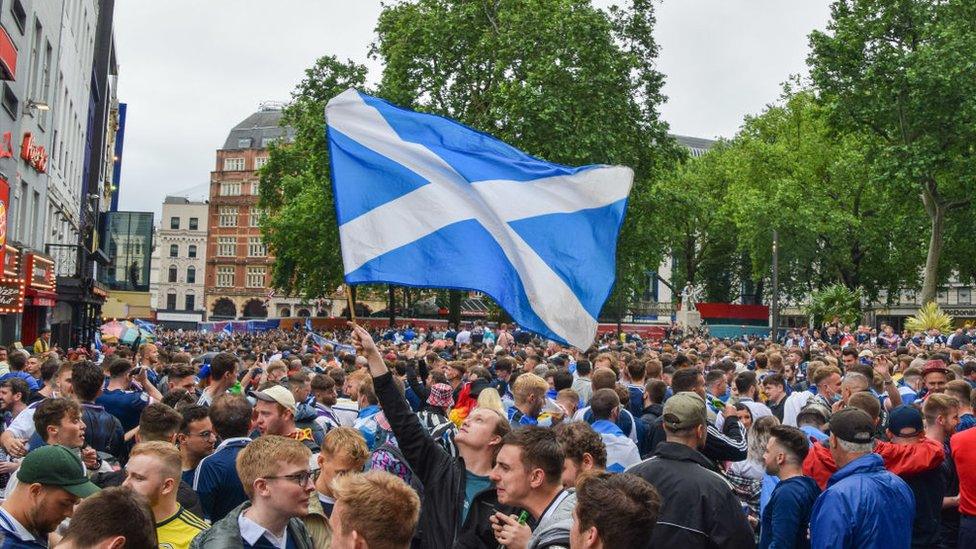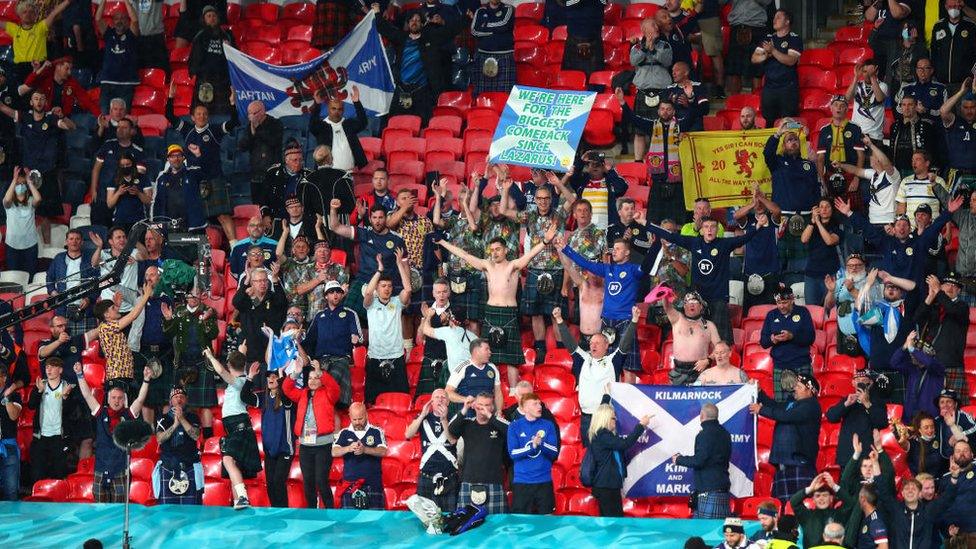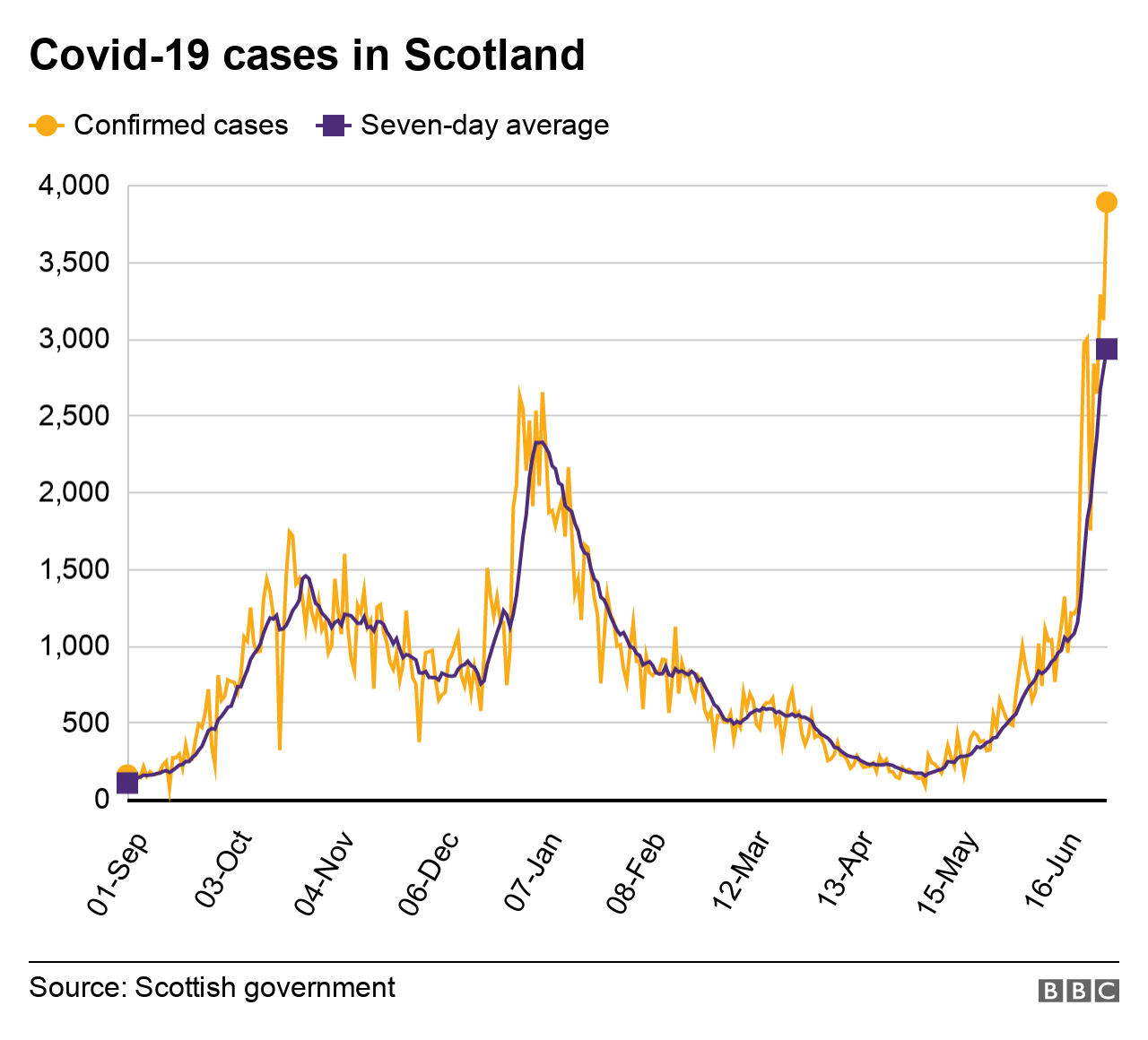Football linked to 2,000 Scottish Covid cases
- Published
- comments

Thousands of fans gathered in Leicester Square ahead of the match with England
Nearly 2,000 Covid cases in Scotland have been linked to people watching Euro 2020 football matches.
Public Health Scotland said two thirds of the 1,991 cases, external were people who travelled to London for Scotland's game with England on 18 June.
This included 397 fans who were inside Wembley for the match.
A relatively small number of cases reported attending the Fanzone in Glasgow, or Scotland's two home matches at Hampden.
Scotland was only allocated 2,600 tickets for the match at Wembley because of Covid restrictions.
But tens of thousands of fans are believed to have travelled to London despite warnings not to do so unless they had a ticket.
Many gathered together in large groups in central London ahead of the game, with those in Leicester Square being moved on by police shortly after half-time.
The country's national clinical director, Prof Jason Leitch said he was disappointed that 2,000 of the 32,000 cases recorded in Scotland since 11 July had been linked to Euro 2020 events.
But he said it was impossible to know whether people had contracted the virus while watching a match or somewhere else, or how many people they may have subsequently infected.
Prof Leitch added: "Some of them may have taken it to London with them, some of them may have got it when they came home.
"But the increasing number of males, the increasing number of young people and the increasing numbers with tagged Euro events, particularly indoor Euro events, and buses and travel would suggest that there is certainly a connection between some of that travel and the Euros".
He stressed that it was important "not to let everyone else off the hook" because "this is not a Euros virus".
He added: "It is of course an important part of the last few weeks, but you can catch the virus even if you weren't at the Euros and were not watching the football."

Nearly 400 of the 2,600 Scotland fans inside Wembley later tested positive for the virus
Public Health Scotland said it had tagged positive Covid cases if they attended either a Euro 2020 organised event, such as a match at Hampden or Wembley Stadium or the Fanzone at Glasgow Green.
People who tested positive after attending an informal gathering, such as a pub or a house party to watch a match, were also tagged.
The report said that 1,294 of the 1,991 total cases had reported travelling to London, including 397 who were actually at the match.
Only 55 of those who tested positive reported being at the Fanzone, while 38 had been at Scotland's match with Croatia at Hampden, and 37 at the team's opening fixture against the Czech Republic.
About 90% of the cases were male, with three quarters of the total - 1,470 cases - being aged between 20 and 39.


There has been a lot of talk about the mixing prompted by watching football being a cause of spread of the virus in Scotland.
It is an easy target given the images of people together in stadiums and fanzone sites.
But the problem with this data is it does not provide the answer to that.
It is contact tracing data used to establish who should be asked to isolate because they may be a close contact of an infected person.
It does not tell you where the individual caught the virus - just where they had been when they were infectious.
So this tells us that 6% of positive cases during this period attended a match, Fanzone, someone's home or the pub to watch a game of football.
The fact that people were out enjoying Scotland's first tournament for 23 years is no surprise.
It's quite likely that led to some transmission - although remember it is indoor settings such as having a drink in the pub or sharing public transport on the way to the game that is more risky than watching a match outdoors - but it's hardly an explanation for Scotland's big rise in cases.

Scotland fan Michael MacLean told BBC Radio Scotland's Drivetime programme that he tested positive for Covid following his trip to London for the match against England.
The 21-year-old travelled from Inverness on the train, visiting pubs and celebrating with other supporters in Leicester Square during his three-night stay in the city.
A few days after returning to Scotland, he showed symptoms of coronavirus.
He said: "Leicester Square, I would say, was the spreader.
"It was an amazing experience, but I am quite gutted I got Covid because that has affected me, affected my work, it has affected my friends."

On Wednesday Scotland recorded 3,887 new cases, which was 9.8% of all tests carried out.
In the past seven days 20,511 positive results have been returned.
Hospital admissions have risen and deaths related to covid are also up, but they are nowhere near the numbers seen during the first two waves of the pandemic.
Health Secretary Humza Yousaf told BBC Scotland earlier this week that the data clearly showed the number of people testing positive was "skewed disproportionately towards young males".
And he said several public health experts had partly put the increase down to the large number of indoor gatherings to watch Euro 2020 matches.
First Minister Nicola Sturgeon had previously denied claims that the Scottish government took a lenient approach to football fans while Scotland was playing in the tournament.
She told a briefing on Tuesday: "We haven't taken a softly, softly approach.
"We were very explicit in saying to fans who didn't have a ticket for Wembley not to travel.
"We can't physically stop every person travelling and significant numbers of people did travel."